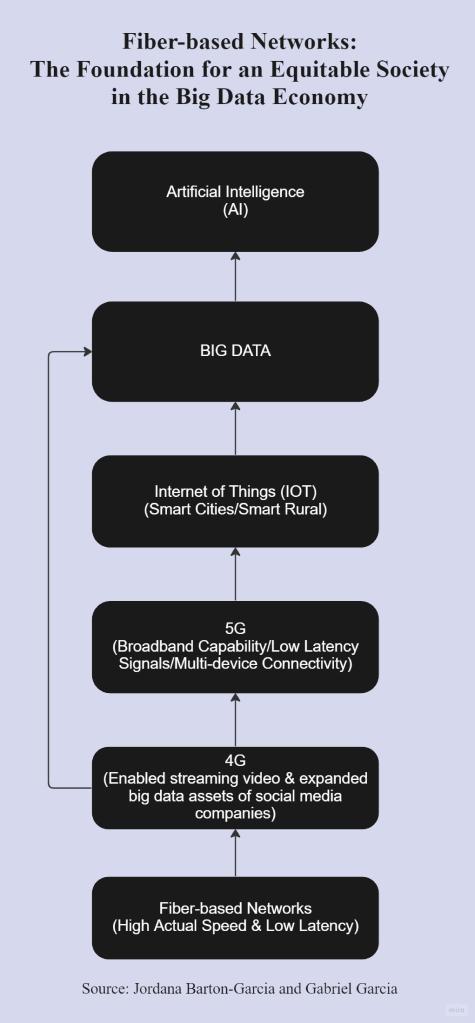#Advance digital equity today or usher in a future of egregious economic inequality
Text
Advance digital equity today or usher in a future of egregious economic inequality - Connect Humanity
At Marconi Society’s “Decade of Digital Inclusion” conference last year, we heard from leaders in technology and digital equity. What follows is a précis of my remarks and some additional reflections for the session, ‘The (Big) Data Economy: Inclusion and Fairness’, in which I focus on the importance of digital equity now to secure a future that works for all.

When ‘good enough’, isn’t good enough
Rural and low-income communities have been expected to make-do with antiquated infrastructure and low-performing technologies offered at high costs, such as legacy copper (DSL) or coaxial cable networks, or satellite service. Time and again, communities are told not to expect fiber-based networks, but to settle for whatever technology is offered to them. In his book, Farm Fresh Broadband, Christopher Ali calls this the “politics of good enough”.
Digital inclusion — having access to quality broadband infrastructure, devices, and the digital skills to use them — is key to upward mobility. It is a portal to healthcare and education, a platform to start and grow a business, and the first rung on the ladder to a well paid job.
For much of the 20th Century, individuals were able to enter the middle class, with or without a college degree, through jobs in manufacturing and retail. Today most jobs have a digital component and employers across sectors look for candidates with well-honed digital skills. If you haven’t grown up with access to data and devices, you’re starting at a disadvantage. And if you don’t have a computer and a connection, good luck applying for a job in a world where recruitment happens almost entirely online.
Digital exclusion doesn’t just punish job seekers, it holds back the creation of jobs in the first place. When a community doesn’t have the fiber infrastructure to attract and retain 21st century businesses, it loses out on so many fronts. Fewer work opportunities. A lower tax base. Less activity in the local economy. Higher unemployment — and the economic and social costs that often follow in distressed communities.
Digital inclusion is economic inclusion
‘Digital exclusion’ is ‘economic exclusion’. By maintaining the digital divide, this politics of ‘good enough’ will perpetuate ever greater income and wealth inequality. By the same token, ‘digital inclusion is economic inclusion’ and by pursuing what Jonathan Sallet calls broadband networks ‘fit for the future’ we can start unwinding the entrenched poverty that has robbed communities of a brighter future.
We cannot miss this moment. The longer we wait to close the digital divide, the harder it’ll be for those on the wrong side to catch up. We have the technology, the established research methodologies and data sets, and best practices. We have business and operating models, philanthropy, and, in the U.S., the Community Reinvestment Act, that can support the connection of low-income, BIPOC, and rural communities that large national providers have not served equitably. Let’s heed the warning of one of our most trusted leaders in broadband policy, Blair Levin: “…our country may take the biggest backwards step any country has ever taken in increasing, rather than closing, the digital divide.” Let’s not blindly proceed on that path.
Civic participation at its best
There are local and regional ISPs, co-ops, local governments, and community partners across the country who are rolling up their sleeves and building next generation broadband networks for underserved communities. And they know better than to aim for the minimum speed, i.e., the FCC’s definition of 25/3 mbps that seems to be frozen in time, driven by a scarcity narrative in a world where accelerating technology demands require that networks ‘fit for the future’ offer far greater speeds. This is civic participation at its best — and the government, philanthropy, and the private sector must support these efforts.
Rather than wasting time entertaining inaccurate, unreliable, expensive maps (at least $44 million for the new FCC “Federal Broadband Map” by CostQuest) and catering to powerful companies that write the rules and misrepresent their service, we must engage with communities to understand their needs, their context, and work with them to shape our shared digital future. This is the work I joined Connect Humanity to do, with a special focus on the Texas-Mexico border region.
When we make investments in local communities, we support an inclusive economy and opportunities for under-represented groups to use, create, and own assets in the digital economy. That level of inclusion is necessary for a diversity of people to become the makers and shapers of fair algorithms, the owners of local and regional ISPs, the ethical managers of the internet of things, and the leaders who engage communities to make policy and law to protect people from the deleterious use of big data and AI.
Here’s a link to replay the panel.
#Advance digital equity today or usher in a future of egregious economic inequality#digital equity#AI#economic inequity#financial futures#skills sets#digital economy
3 notes
·
View notes